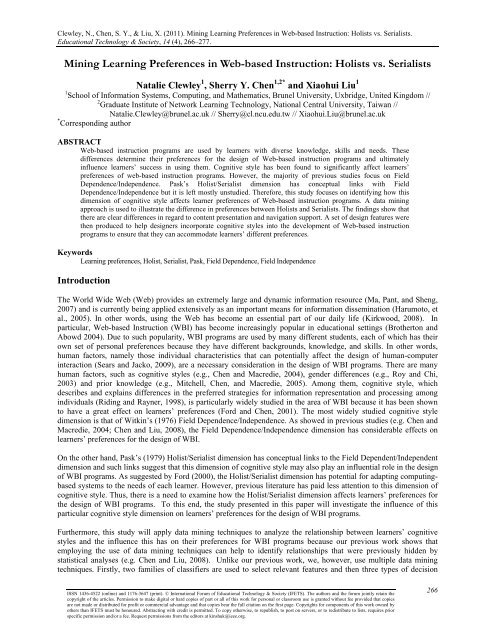October 2011 Volume 14 Number 4 - Educational Technology ...
October 2011 Volume 14 Number 4 - Educational Technology ...
October 2011 Volume 14 Number 4 - Educational Technology ...
Create successful ePaper yourself
Turn your PDF publications into a flip-book with our unique Google optimized e-Paper software.
Clewley, N., Chen, S. Y., & Liu, X. (<strong>2011</strong>). Mining Learning Preferences in Web-based Instruction: Holists vs. Serialists.<br />
<strong>Educational</strong> <strong>Technology</strong> & Society, <strong>14</strong> (4), 266–277.<br />
Mining Learning Preferences in Web-based Instruction: Holists vs. Serialists<br />
Natalie Clewley 1 , Sherry Y. Chen 1,2* and Xiaohui Liu 1<br />
1 School of Information Systems, Computing, and Mathematics, Brunel University, Uxbridge, United Kingdom //<br />
2 Graduate Institute of Network Learning <strong>Technology</strong>, National Central University, Taiwan //<br />
Natalie.Clewley@brunel.ac.uk // Sherry@cl.ncu.edu.tw // Xiaohui.Liu@brunel.ac.uk<br />
* Corresponding author<br />
ABSTRACT<br />
Web-based instruction programs are used by learners with diverse knowledge, skills and needs. These<br />
differences determine their preferences for the design of Web-based instruction programs and ultimately<br />
influence learners’ success in using them. Cognitive style has been found to significantly affect learners’<br />
preferences of web-based instruction programs. However, the majority of previous studies focus on Field<br />
Dependence/Independence. Pask’s Holist/Serialist dimension has conceptual links with Field<br />
Dependence/Independence but it is left mostly unstudied. Therefore, this study focuses on identifying how this<br />
dimension of cognitive style affects learner preferences of Web-based instruction programs. A data mining<br />
approach is used to illustrate the difference in preferences between Holists and Serialists. The findings show that<br />
there are clear differences in regard to content presentation and navigation support. A set of design features were<br />
then produced to help designers incorporate cognitive styles into the development of Web-based instruction<br />
programs to ensure that they can accommodate learners’ different preferences.<br />
Keywords<br />
Learning preferences, Holist, Serialist, Pask, Field Dependence, Field Independence<br />
Introduction<br />
The World Wide Web (Web) provides an extremely large and dynamic information resource (Ma, Pant, and Sheng,<br />
2007) and is currently being applied extensively as an important means for information dissemination (Harumoto, et<br />
al., 2005). In other words, using the Web has become an essential part of our daily life (Kirkwood, 2008). In<br />
particular, Web-based Instruction (WBI) has become increasingly popular in educational settings (Brotherton and<br />
Abowd 2004). Due to such popularity, WBI programs are used by many different students, each of which has their<br />
own set of personal preferences because they have different backgrounds, knowledge, and skills. In other words,<br />
human factors, namely those individual characteristics that can potentially affect the design of human-computer<br />
interaction (Sears and Jacko, 2009), are a necessary consideration in the design of WBI programs. There are many<br />
human factors, such as cognitive styles (e.g., Chen and Macredie, 2004), gender differences (e.g., Roy and Chi,<br />
2003) and prior knowledge (e.g., Mitchell, Chen, and Macredie, 2005). Among them, cognitive style, which<br />
describes and explains differences in the preferred strategies for information representation and processing among<br />
individuals (Riding and Rayner, 1998), is particularly widely studied in the area of WBI because it has been shown<br />
to have a great effect on learners’ preferences (Ford and Chen, 2001). The most widely studied cognitive style<br />
dimension is that of Witkin’s (1976) Field Dependence/Independence. As showed in previous studies (e.g. Chen and<br />
Macredie, 2004; Chen and Liu, 2008), the Field Dependence/Independence dimension has considerable effects on<br />
learners’ preferences for the design of WBI.<br />
On the other hand, Pask’s (1979) Holist/Serialist dimension has conceptual links to the Field Dependent/Independent<br />
dimension and such links suggest that this dimension of cognitive style may also play an influential role in the design<br />
of WBI programs. As suggested by Ford (2000), the Holist/Serialist dimension has potential for adapting computingbased<br />
systems to the needs of each learner. However, previous literature has paid less attention to this dimension of<br />
cognitive style. Thus, there is a need to examine how the Holist/Serialist dimension affects learners’ preferences for<br />
the design of WBI programs. To this end, the study presented in this paper will investigate the influence of this<br />
particular cognitive style dimension on learners’ preferences for the design of WBI programs.<br />
Furthermore, this study will apply data mining techniques to analyze the relationship between learners’ cognitive<br />
styles and the influence this has on their preferences for WBI programs because our previous work shows that<br />
employing the use of data mining techniques can help to identify relationships that were previously hidden by<br />
statistical analyses (e.g. Chen and Liu, 2008). Unlike our previous work, we, however, use multiple data mining<br />
techniques. Firstly, two families of classifiers are used to select relevant features and then three types of decision<br />
ISSN <strong>14</strong>36-4522 (online) and 1176-3647 (print). © International Forum of <strong>Educational</strong> <strong>Technology</strong> & Society (IFETS). The authors and the forum jointly retain the<br />
copyright of the articles. Permission to make digital or hard copies of part or all of this work for personal or classroom use is granted without fee provided that copies<br />
are not made or distributed for profit or commercial advantage and that copies bear the full citation on the first page. Copyrights for components of this work owned by<br />
others than IFETS must be honoured. Abstracting with credit is permitted. To copy otherwise, to republish, to post on servers, or to redistribute to lists, requires prior<br />
specific permission and/or a fee. Request permissions from the editors at kinshuk@ieee.org.<br />
266

















